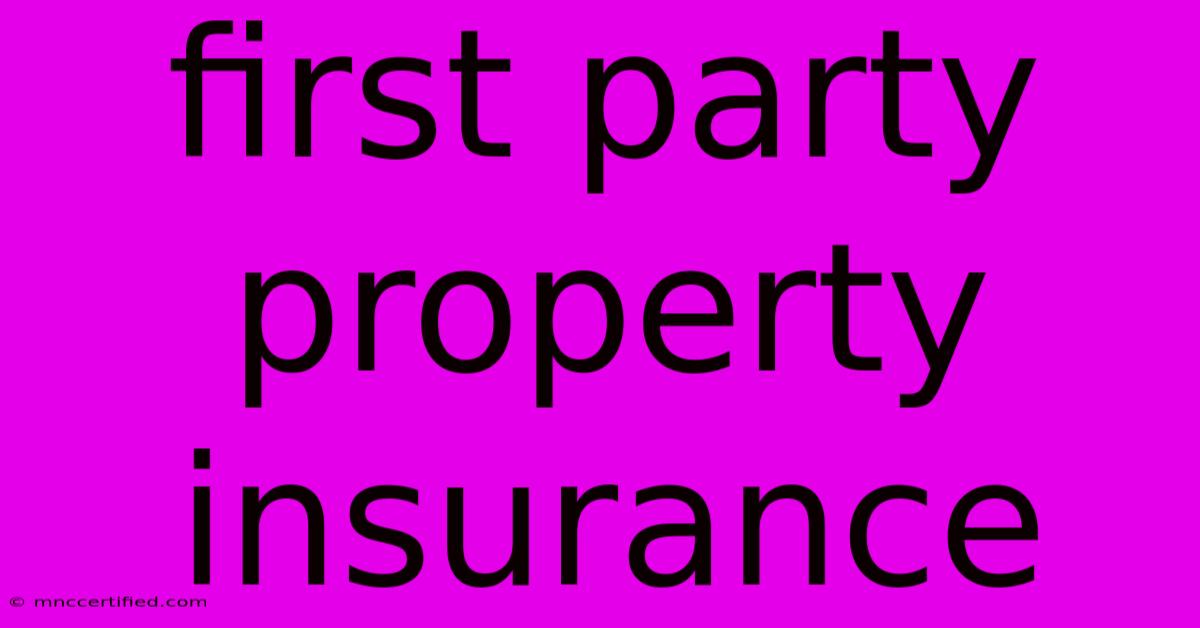First Party Property Insurance

Table of Contents
First-Party Property Insurance: Protecting Your Investment
First-party property insurance is a crucial aspect of financial security, offering vital protection against unforeseen events that could damage or destroy your property. Understanding its intricacies is essential for homeowners, renters, and business owners alike. This comprehensive guide delves into the nuances of first-party property insurance, explaining its coverage, different types, and how to choose the right policy for your needs.
What is First-Party Property Insurance?
First-party property insurance, also known as property insurance, covers losses or damages to your own property. Unlike liability insurance (which covers your responsibility for damage to other people's property), this policy protects your investment by reimbursing you for losses caused by covered perils. These perils can include, but aren't limited to, fire, windstorms, hail, theft, vandalism, and certain types of water damage. The policy essentially acts as a financial safety net, helping you rebuild or repair your property after a covered incident.
Key Differences from Liability Insurance
It's important to distinguish first-party property insurance from liability insurance. Liability insurance protects you from financial responsibility for injuries or damages you cause to others. Property insurance, on the other hand, focuses solely on protecting your own assets. Many homeowner's and renter's insurance policies bundle both first-party and liability coverage into a single package, providing comprehensive protection.
Types of First-Party Property Insurance
Several types of first-party property insurance cater to different needs:
-
Homeowners Insurance: This is the most common type, providing coverage for single-family homes, townhouses, and condominiums. It typically includes dwelling coverage (the structure itself), personal property coverage (belongings inside the home), liability coverage, and additional living expenses coverage (if you need temporary housing after a covered loss).
-
Renters Insurance: Renters often overlook this essential coverage, but it's vital for protecting personal belongings against damage or theft. Renters insurance typically covers personal property and liability, offering peace of mind for renters.
-
Commercial Property Insurance: Businesses need specialized policies to protect their buildings, equipment, inventory, and other assets. These policies offer broader coverage tailored to the specific risks faced by different businesses.
-
Flood Insurance: Flood damage is often excluded from standard homeowners and renters insurance policies. Separate flood insurance, provided by the National Flood Insurance Program (NFIP) or private insurers, is essential for properties in flood-prone areas.
-
Earthquake Insurance: Similar to flood insurance, earthquake coverage is often a separate policy, as earthquake damage is typically excluded from standard policies. This is particularly important in seismically active regions.
Understanding Your Policy: Coverage and Exclusions
Your first-party property insurance policy will outline the specific coverage provided and any exclusions. Carefully reviewing this document is crucial. Key aspects to understand include:
-
Coverage Limits: These are the maximum amounts your insurer will pay for covered losses.
-
Deductibles: This is the amount you'll pay out-of-pocket before your insurance coverage kicks in.
-
Exclusions: Specific events or damages that are not covered by your policy. Common exclusions include floods, earthquakes (unless specifically added), and acts of war.
-
Endorsements: These are add-ons that expand your coverage to include specific perils or situations not covered by your basic policy.
Choosing the Right First-Party Property Insurance
Selecting the right policy involves careful consideration of several factors:
-
Assess your risks: Identify potential hazards specific to your property and location.
-
Determine your coverage needs: Calculate the replacement cost of your property and belongings.
-
Compare quotes from multiple insurers: Shop around to find the best rates and coverage options.
-
Read the policy carefully: Understand the terms, conditions, coverage limits, and exclusions before signing.
First-party property insurance is a fundamental element of risk management. By understanding its nuances and choosing the right policy, you can protect your valuable assets and secure your financial future. Don't hesitate to consult with an insurance professional to determine the best coverage for your unique circumstances.

Thank you for visiting our website wich cover about First Party Property Insurance. We hope the information provided has been useful to you. Feel free to contact us if you have any questions or need further assistance. See you next time and dont miss to bookmark.
Featured Posts
-
Assignment 1 1 Insurance Plans
Nov 27, 2024
-
Saracens Boss Departs After Short Stint
Nov 27, 2024
-
Psg Squad Kimpembe Ramos Vs Bayern
Nov 27, 2024
-
Morgan Freemans Rare Dinner Outing
Nov 27, 2024
-
Rohl Sheffield Wednesdays Push
Nov 27, 2024